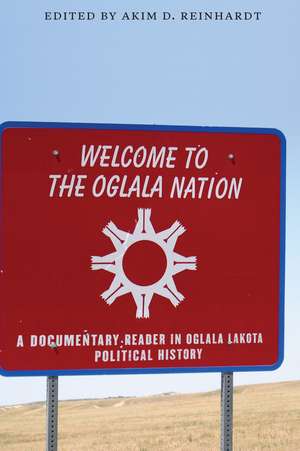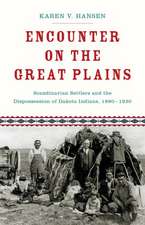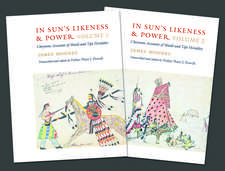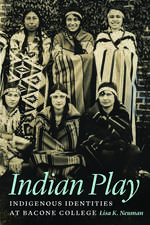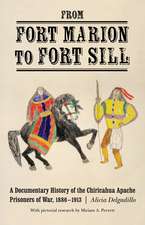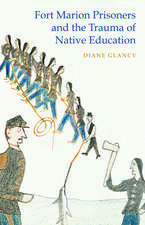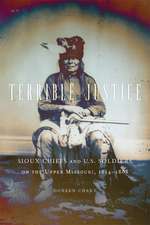Welcome to the Oglala Nation: A Documentary Reader in Oglala Lakota Political History
Editat de Akim D. Reinhardten Limba Engleză Hardback – sep 2015
Popular culture largely perceives the tragedy at Wounded Knee in 1890 as the end of Native American resistance in the West, and for many years historians viewed this event as the end of Indian history altogether. The Dawes Act of 1887 and the reservation system dramatically changed daily life and political dynamics, particularly for the Oglala Lakotas. As Akim D. Reinhardt demonstrates in this volume, however, the twentieth century continued to be politically dynamic. Even today, as life continues for the Oglalas on the Pine Ridge Reservation in southwestern South Dakota, politics remain an integral component of the Lakota past and future.
Reinhardt charts the political history of the Oglala Lakota people from the fifteenth century to the present with this edited collection of primary documents, a historical narrative, and a contemporary bibliographic essay. Throughout the twentieth century, residents on Pine Ridge and other reservations confronted, resisted, and adapted to the continuing effects of U.S. colonialism. During the modern reservation era, reservation councils, grassroots and national political movements, courtroom victories and losses, and cultural battles have shaped indigenous populations. Both a documentary reader and a Lakota history, Welcome to the Oglala Nation is an indispensable volume on Lakota politics.
Preț: 429.51 lei
Nou
Puncte Express: 644
Preț estimativ în valută:
82.18€ • 85.81$ • 68.02£
82.18€ • 85.81$ • 68.02£
Carte tipărită la comandă
Livrare economică 05-19 aprilie
Preluare comenzi: 021 569.72.76
Specificații
ISBN-13: 9780803268463
ISBN-10: 0803268467
Pagini: 306
Ilustrații: 1 map, index
Dimensiuni: 152 x 229 x 29 mm
Greutate: 0.61 kg
Editura: Nebraska
Colecția University of Nebraska Press
Locul publicării:United States
ISBN-10: 0803268467
Pagini: 306
Ilustrații: 1 map, index
Dimensiuni: 152 x 229 x 29 mm
Greutate: 0.61 kg
Editura: Nebraska
Colecția University of Nebraska Press
Locul publicării:United States
Notă biografică
Akim D. Reinhardt is an associate professor of history at Towson University. He is the author of Ruling Pine Ridge: Oglala Lakota Politics from the IRA to Wounded Knee, winner of the 2008 Great Plains Distinguished Book Prize.
Cuprins
Preface
Acknowledgments
A Note on Terminology
Introduction
Oglala Political History: An Overview
Documents in Oglala Lakota Political History
1. Origins of the Oceti Sakowi?
2. Oglala Winter Counts
3. Jean-Baptiste Truteau Describes Lakota Politics and Expansion (1795)
4. Treaty with the Sioune and Oglala Tribes (1825)
5. Francis Parkman Observes an Oglala Political Meeting (1846)
6. Oglalas Meet with U.S. Officials (1867–1868)
7. Second Treaty of Fort Laramie (1868)
8. Breaking Up the Great Sioux Reservation (1889)
9. Breaking Up Pine Ridge Reservation and Organizing Bennett County (1910)
10. Preamble to the Constitution and Bylaws of the Oglala Tribal Council (1921)
11. John Collier’s Plains Congress, Rapid City, South Dakota (1934)
12. The Indian Reorganization Act (1934)
13. Preamble to the Constitution and Bylaws of the Oglala Sioux Tribe of the Pine Ridge Reservation of South Dakota (1936)
14. Final Meeting of the Oglala Tribal Council (1936)
15. Oglala Sioux Tribal Council Resolution No. 1 (1936)
16. Meetings of the Oglala Sioux Tribal Council (1936)
17. Christianity and Politics on Pine Ridge Reservation (1936–1937)
18. Initial Ordinances and Resolutions of Oglala Sioux Tribal Council (1937)
19. Early Ordinances and Resolutions of Oglala Sioux Tribal Council (1938)
20. Oglala Sioux Tribe Bans Display of “Uncivilized Practices” (1938)
21. Office of Indian Affairs Monitors the Cutting of Timber (1940)
22. Office of Indian Affairs Curtails Oglala Sioux Tribal Authority (1942)
23. Letters of Frank Ecoffey (1942)
24. Office of Indian Affairs Officials Suggest Forcing Pine Ridge Oglalas to Contribute to War Effort (1943)
25. Interior Secretary Harold Ickes Restricts Tribal Government Membership (1943)
26. Tribal Council Terminates the Tribal Buffalo Herd (1944)
27. Letter Granting Mr. and Mrs. Fast Horse Permission to Leave Pine Ridge Reservation (1945)
28. Resolution to Remove Pine Ridge Superintendent W. O. Roberts (1945)
29. Tribal Council Authorizes a Delegation to Washington DC (1946)
30. Porcupine District Council Demands a “White Man” as Farm Agent (1946)
31. Congress Authorizes Compensation for Gunnery Range Land Seizures (1956)
32. Commissioner of Indian Affairs Demands Greater Bureaucratic Efficiency (1960)
33. Edison Ward Interviews South Dakota State Attorney Robert Maule (1964)
34. Tribal President Johnson Holy Rock Interviewed (1967)
35. Former Tribal Council Member Thomas Conroy Interviewed (1967)
36. Future Tribal President Gerald One Feather Interviewed (1967)
37. Oglala Sioux Tribe Bill of Rights (1968)
38. Interior Department Certifies Pine Ridge Elections (1968)
39. Presidential Hopeful Robert Kennedy Visits Pine Ridge Reservation (1968)
40. Political Tensions on Pine Ridge Reservation (1970)
41. Tribal Council Attempts to Suspend the Tribal President and Vice President (1971)
42. Conflict on Pine Ridge Reservation (1972)
43. Tribal President Richard Wilson’s Inauguration (1972)
44. Tribal Council Seats Representative Kills Straight (1972)
45. Pine Ridge Superintendent Stanley Lyman Interviewed (1972)
46. Tribal President Richard Wilson’s Impeachment Hearing (1973)
47. Anti-Wilson Tribal Member Interviewed (1973)
48. A Tribal Policeman’s Observations of Pine Ridge Reservation (1973)
49. Tribal President Richard Wilson Discusses Pine Ridge Politics (1973)
50. Chuck Trimble Discusses the Current Political Situation (1974)
51. U.S. Civil Rights Commission Report on Pine Ridge Election (1974)
52. United States vs. Sioux Nation of Indians (1980)
53. President Bill Clinton Addresses Pine Ridge Reservation (1999)
54. Camp Justice Protests Alcohol Sales and Unsolved Murders at Whiteclay, Nebraska (2000)
55. Protests at Red Cloud Administration Building End (2001)
56. Tribal President Cecilia Fire Thunder Is Impeached (2006)
57. Federal Approval of Casino Gambling on Pine Ridge Reservation (1993)
58. Prairie Wind Casino Opens on Pine Ridge Reservation (2007)
59. Amendment to the Oglala Sioux Tribal Constitution (2008)
60. Oglala Sioux Tribe Debates Legalizing Alcohol on Pine Ridge Reservation (2014)
Appendixes
Notes
Glossary and Pronunciation Guide
Bibliographic Essay
Index
Recenzii
"Reinhardt has produced an accessible collection of resources that both novices and scholars will find useful."—David Christensen, Kansas History
"A welcome contribution to American Indian history."—Jace Decory, South Dakota History
"Reinhardt covers more Lakota history and culture in one book than any other collective publication I have seen or read. It is a very thorough, accurate, and powerful collection of primary source documents. . . . The publication is a very useful teaching tool and a valuable source of information for interested readers."—Tribal College Journal
"A fresh tapestry of Lakota and Dakota history."—Roundup Magazine
"Welcome to the Oglala Nation: A Documentary Reader in Oglala Lakota Political History is more than a documentary reader. Through a combination of primary documents, historical narrative, and historiography, Akim Reinhardt provides a comprehensive overview of more than 500 years of Oglala Lakota political history."—Margaret Huettl, Great Plains Quarterly
“Akim Reinhardt’s Welcome to the Oglala Nation is a powerful combination of narrative description and primary documents that provides the reader with a deeper understanding of Oglala political history. Both the novice and the expert should find it useful.”—David R. M. Beck, professor of Native American studies at the University of Montana and coauthor of City Indian: Native American Activism in Chicago, 1893–1934
“Gathered in these pages is the story of one of the Great Plains’ ultimate survivors: the Oglala Lakotas. Covering the days when they first left the eastern woodlands for the prairie up to contemporary tribal politics, Akim Reinhardt has compiled vital information for scholars and armchair historians alike.”—Stew Magnuson, author of The Death of Raymond Yellow Thunder and Wounded Knee 1973: Still Bleeding
